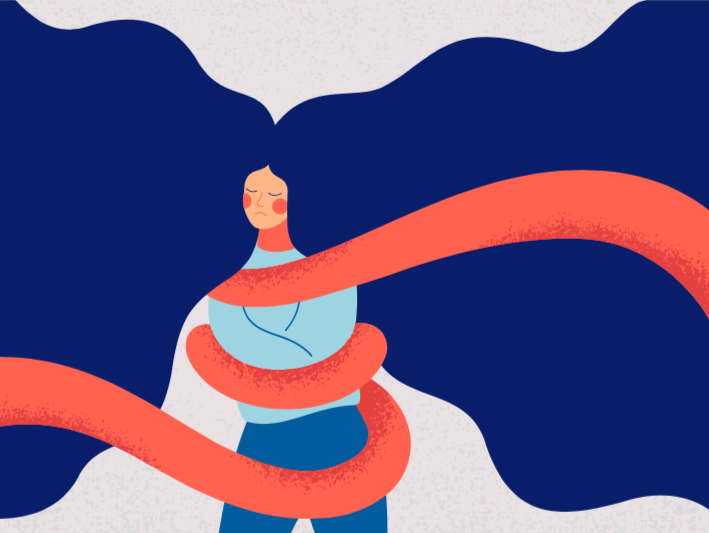5 More Reasons to Join Trauma & Abuse: The Unshaming Way
Can I help you make a decision?
I want to show you why Trauma & Abuse: The Unshaming Way will benefit you, your life, and all those around you.
This program will transform the way you feel about and respond to your personal story forever. Here’s how:
Answering your questions about Trauma & Abuse: The Unshaming Way
Many of you have sent in questions about this program, so I wanted to take a moment to answer them here:
Why is it important to go through your abuse story?
If you don’t heal your abuse story and learn to view it with unshaming eyes, it can become your life story. You will continue to repeat the same themes and hurts of past abuse in your life, career, relationships, internal criticism, etc.
The unrecognized cost of unhealed trauma
When we are traumatized, parts of ourselves get split off, relegated to the shadow.
We lose access to ourselves - our power, our sensitivity, our self-trust, our protective instincts, our ability to distinguish harmful people/situations from safer ones.
Why it’s important to work through your abuse story
Your abuse story is the story that lives in your mind, body, and spirit surrounding the trauma you’ve experienced.
For many people, this story lives UNCONSCIOUSLY inside of them - running their life without them even realizing it.
How to work on trauma without the pain of shame
Please be careful to not re-traumatize yourself when working on your trauma.
Why would that happen?
Let’s think of it this way.
5 common concerns about working with abuse
Many people come to me saying, “David, I’m so drawn to what you’ve said about Trauma & Abuse: The Unshaming Way. I feel called to this work. But I’m afraid that…”
And they share very valid reasons why they’re not sure if this is the right program for them to do right now.
So today, I want to walk you through some of the most common concerns I hear to help you decide if Trauma & Abuse: The Unshaming Way is right for you.
Read this if you feel like your abuse wasn’t “bad enough”
Your feelings and story need to be witnessed.
Whenever a person says their abuse was "not that bad" or "as bad as someone else's," I know their story and feelings have not been fully witnessed.
There are many, many examples of abuse beyond the obvious things.
Yes - being physically or sexually violated are horrific, unjust, and fucked up. No person deserves to go through that.
But abuse also includes more subtle and insidious violence:
If you’ve been criticized or neglected…
A powerful story from one of my greatest teachers
I want to share a story from one of my greatest mentors, the poet and activist Maya Angelou.
Maya was raped at 8 years old. She was frightened to name the person who did it, because she thought her relatives would hurt him.
A few days after she told her relatives, the man who raped her was found dead.
Maya realized in that moment how powerful her voice was. That it could be deadly.
For the next five and a half years, she didn’t utter a single word.
3 myths about abuse and trauma that are hurting us
Today, I’m sharing the 3 most common myths I hear about abuse, so you can begin to see how it may be influencing your life in ways you didn’t realize:
MYTH #1: All violent interactions are abuse
When I use the word abuse, I’m looking at the impact it has on a person.
What really happens when you work on your abuse & trauma
What have I gotten out of working on my abuse and trauma?
There are a ton of symptoms I wanted to be relieved of:
Body symptoms, including irritable bowel syndrome (yes directly related to my early abuse)
Accommodating others and fawning too readily, instead of attending to my own needs
AND MORE...
Finding the wisdom in dissociation
This is what happens when you go deeper…
I worked with a man who said he suffered from dissociation.
Dissociation can be disturbing and distressing. AND –
Dissociation is natural, organic, and ripe with nature’s inherent intelligence.
Enrollment now open for Trauma & Abuse: The UnShaming Way
The doors to Trauma & Abuse: The Unshaming Way are now open.
Click here to learn more and enroll now.
I put this course together after years of my students asking for more support in processing their abuse and trauma from an unshaming perspective.
It’s a compilation of everything I learned on my own unshaming journey, the wisdom I’ve inherited from teachers, and my time working as a psychology student and professor.
Free Live Training: Anatomy of Abuse & Trauma
Have you begun to work on your abuse and trauma – those stories and events that created patterns and feelings that cause great suffering in your life?
Internalized abuse happens when you experience violence and that violence is denied, dismissed, or gaslighted by others. When this happens, abuse becomes trauma.
But trauma is not inevitable.
6 Ways Your Life Changes When You Find the Power in Your Trauma Story
What actually happens when you alchemize your abuse? How does your life change?
Here are 6 milestones you can expect to cross once you begin this journey:
Milestone #1: Nourish your self-love
When you alchemize your abuse, you remove the shame that has been blocking you from seeing and understanding the full picture.
Why is now the Best Time to Start Alchemizing Your Abuse?
The trauma of abuse can stay with us for years, or even for a lifetime.
Some of us can feel the shame and trauma around a past abuse radiating outwards like pain around a wound, constantly reminding us that we need to heal.
The Story of My Internalized Abuse
When I was around 10 years old, I went to summer camp.
They divided us into two groups and positioned us against each other in a boxing competition.
I didn’t know how to box. But I put my padded gloves on and did what I thought I was supposed to do.
Why UnShaming is an urgent need
6 urgent reasons to UnShame now
I’m often asked why I consider shame to be such a destructive force.
Today, I want to walk you through the top 6 reasons why addressing shame is urgent…
Overcoming Body Shame: Developing Your Inner Authority
Weight loss programs abound. It’s a $70 billion industry that is 95% ineffective. So why keep trying? Why keep taking their advice? Or, more importantly, why do we keep looking at ourselves, evaluating ourselves, and criticizing ourselves through eyes that not only steer us in the wrong direction, but worse—eyes that sear and burn? Eyes that injure.
Abuse, Trauma, Weight-loss and Body Shame
When I ask people how they think trauma interacts with body size, I often hear statements like, “I’m really bad when it comes to eating my feelings,” or “I overindulge in comfort food.” These self-shaming messages echo the messages of conventional weight loss programs and books. First, something made you upset, and then the thing you did to take care of yourself afterward…well, you should feel upset about that, too. It’s pretty insidious.
Hunger for Food, Hunger for Life
Have you ever tried to ignore your hunger for food? Many diet programs tell you to wait a half hour. Brush your teeth. Chew a piece of gum. Go for a run. And those methods can work, but only for a while. Not to mention they often backfire, because we all know what it’s like to be so hungry that the idea of portion control is untenable. And that’s just relating hunger to food.



















